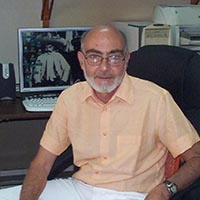Kurt Bernardo Wolf
Instituto de Ciencias Físicas, Universidad Nacional Autónoma de México, Cuernavaca Campus, MexicoFor outstanding and numerous contributions to mathematical optics, including signal analysis, by employing symmetry methods known as group theory.

From a young age, Kurt Bernardo Wolf knew he wanted to pursue science. His father was an engineer and provided childhood toys that included a microscope, a telescope, and a Meccano engineering set. He entered the School of Science (Facultad de Ciencias) of the Universidad Nacional Autónoma de México in the early 1960s. He found mathematical physics and other theoretical subjects to be his primary interest. His BSc thesis was on particularly early computer methods, used on the nuclear shell model developed by his advisor Marcos Moshinsky, with whom he later collaborated on in the subject of linear canonical transformations in quantum mechanics. Bernardo’s PhD studies were in Israel, started at the Weizmann Institute and completed at Tel-Aviv University, Israel, under the guidance of Professor Yuval Ne’eman, who had gleaned the existence of quarks within hadrons and mesons. Before returning to Mexico, he was a postdoc associate at Chalmers University of Technology in Gothenburg, Sweden.
In his career, Bernardo did not at first work directly in optics. Upon returning to Mexico, he developed Fourier integral transforms and enlarged to complex linear canonical functions for use in both diffusive phenomena and others connected to irreducible representations of the Lorenz Group for potential use in relativity. His first book, Integral Transforms in Science and Engineering, was aimed as a reference volume. In the last three chapters, it included the first account of these complex transforms, originally based on work by Marcos Moshinsky and Christiane Quesne, and achieved a wide readership at that time. Later, after reading the work of Alex J. Dragt on aberration calculations for the (failed) Superconducting Supercollider, he realized that the group-theoretical methods he developed would be useful for optics. So, entering through aberration optics, he came to the linear part of the transformations in both geometric and wave optics.
Geometric optics seen through the lens of group theory became Bernardo’s focus for many years. He worked on incorporating phase space into the description of rays and systems and including fractional Fourier transformers and the generic symplectic group Sp(4, R) of transformations that conserve the Hamiltonian structure of optical systems. Bernardo comments, “This philosophy and the concomitant new theorems and mathematical tactics resulted in the opening of geometric optics as a group-theoretical system, that was extended in a natural form to the metaxial régime of aberrations.” In 2004, he published a second book, Geometric Optics on Phase Space. Concurrently, he published two books in Spanish on scientific TeX typography and one in scientific humanities.
A third and more recent area of research, initiated with Natig M. Atakishiyev, pertains to “finite optics.” He explains, “Basically, we replace the Hermite functions of wave optics with the finite Kravchuk functions, which take values on the discrete pixels. There too, one can find unitary transformations that mimic the canonical ones in the linear and the aberration régimes.”
In a more personal vein, it can be said that in his early years, Bernardo was quite adventurous. He shares, “In my youth I enjoyed climbing all the Mexican glaciated peaks. As a graduate student, during the golden 1960s, I did some extensive hitchhiking around Africa and South Asia, up to the Kilimanjaro and a few lesser peaks around the world,” publishing his exploits in a Mexican newspaper, now to become his fourth book in Spanish.
Bernardo served as head organizer for about a dozen scientific meetings, and edited their proceedings, most of them in the framework of the Centro Internacional de Ciencias AC, of which he was founding director in his home town of Cuernavaca. Having published ca. 200 refereed papers, he reflects that research publications which were seen as a true Benefit for the learned community, have recently become monetized: one more business for big editorial companies and shareholders, and one more impediment for researchers in less affluent countries to contribute to world knowledge. Free exchanges of information and open access should be promoted and not be taxed, he emphasizes, but should allow scientists of all countries to participate in the construction of our common house of science.
Photo Credit: Kurt Bernardo Wolf
